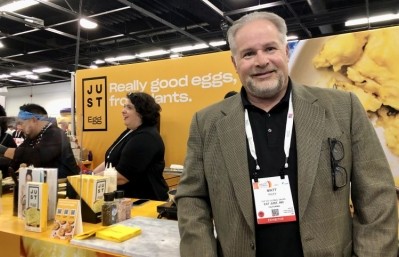Shiru teams up with Puratos to develop next generation egg replacers

Under the deal, Shiru will use Puratos’ fermentation capability and expertise to produce prototype quantities of promising ingredients, test them in baked goods, and then – should they identify viable solutions - facilitate “rapid commercialization.”
Unlike The EVERY Company, which is retooling the DNA of microbes to make proteins bio-identical to proteins found in chicken eggs such as albumin and ovomucoid, Shiru is instead using machine learning and bioinformatics to mine databases of plant proteins with functional properties such as gelation, and then expressing them in microbes.
The resulting ingredients – while manufactured by microbes – are plant proteins, and will be labeled as such.
Machine learning
So how does Shiru’s machine-learning approach identify promising proteins?
A conventional approach might be, “Here's an egg protein that's folded in this way, let's find some plant proteins that fold in a similar way,” Shiru’s VP business development, Julian Lewis told FoodNavigator-USA.
“What we're doing is using something called embeddings, which is based on natural language processing, a bit like when you do a Google search and one word leads to another word, and there are no similarities between those words, but they mean the same thing.
“And we think of that approach to find proteins in our database that superficially have no connection with, let's say, egg ovalbumin, but through this NLP-based approach, we're able to have a high degree of confidence that there will, in fact, be a functional connection.”
Shiru – founded by biochemist and former Eat Just director of food chemistry Dr Jasmin Hume in 2019 (pictured left) - is using machine learning and bioinformatics to mine databases of plants to identify proteins with functional qualities found in eggs such as gelation, foaming, and emulsification.
Rather than extracting these proteins from plants, which may not be efficient or sustainable if they’re only present in small quantities, Shiru is expressing them via genetically engineered host microorganisms such as yeast or fungi.
Image credit: Shiru
How do you find the proteins you want to make in the first place?
“So some companies like Ginkgo Bioworks have deep expertise in developing high performing [microbial production] strains and scaling things up to be economical,” said Lewis.
“But the special area of expertise Shiru has is identifying proteins with very specific functions, as that’s the key question: How do you find the proteins you want to make in the first place? Companies come to us and say I want you to find me something that does this, so how do you make that initial discovery? And that's at the heart of Shiru’s business.”
"We interrogate hundreds of millions of proteins using machine learning algorithms to look for proteins that can do what eggs do in baked goods, so that gelling, structure-forming function. Then we've isolated our search down to some very strong candidates, which we've validated in the lab. And now what Puratos is helping us to do is scale up food-grade quantities of these proteins so they can do food application tests in cakes and fillings.”
Generating a shortlist
After promising candidates are identified, the next step is determining “whether they are expressible at any useful level” by microbes in fermentation tanks by using a “workhorse” microbial strain. This then generates a shortlist of candidate proteins that will be produced in small quantities and tested to see if they deliver the kind of performance Puratos is looking for in baked goods, said Lewis.
“We’ll then start developing tailored strains that can deliver the highest performing economic yield.”
Finally, Puratos and Shiru will be “jointly validating the performance of cakes and fillings versus benchmarks, and if that works,” he said, “We hope to commercially scale in partnership together.”
'We’re looking at a range of proteins that provide a spectrum of functionality’
So are Shiru and Puratos looking at one protein, or several?
While chicken eggs contain hundreds of proteins, not all of them are mission critical for the kind of functionality Puratos is looking for, noted Lewis: “Ultimately, it could be that we need to use a slightly different protein for each of the functions, and so this is what's going to be investigated through these trials. But we’re looking at a range of proteins that provide a spectrum of functionality.”
Why replace eggs in the first place?
Food manufacturers are looking to replace eggs for multiple reasons.
For some, it's about ethics: they feel that industrialized egg production is cruel and environmentally unsustainable. For others, it's about tapping into the 'plant-based' trend, or avoiding allergens. Many brands, meanwhile, have simply been burned too many times by the volatility of the egg market and want to find alternatives that come with more consistent pricing, safety, and availability.
While there are now multiple egg replacers on the market, including some developed by Puratos, they don’t typically work in every application, so one might work well as a scrambled egg replacement, but not so well in baking a cake, for example, said Lewis.
“When you look at some of the solutions are out there, they're good for certain types of application, but not so good in other types of applications.”
Structured fats: 'We're looking at oleogelation'
Shiru – which recently teamed up with CP Kelco to explore label-friendly alternatives to methylcellulose – is also looking at structured fats that have the performance of solid fats without the nutritional or sustainability drawbacks.
“We’re looking at oleogelation as a way of producing structured fats that are solid at room temperature,” said Lewis. “So these are systems with very few ingredients, primarily a liquid oil and protein combined using a unique production method that creates this fat that’s solid at room temperature.
“We're very excited about the potential of these fats and we are looking to work in partnership with some CPG and ingredient manufacturers to help us validate the performance of those.”



















